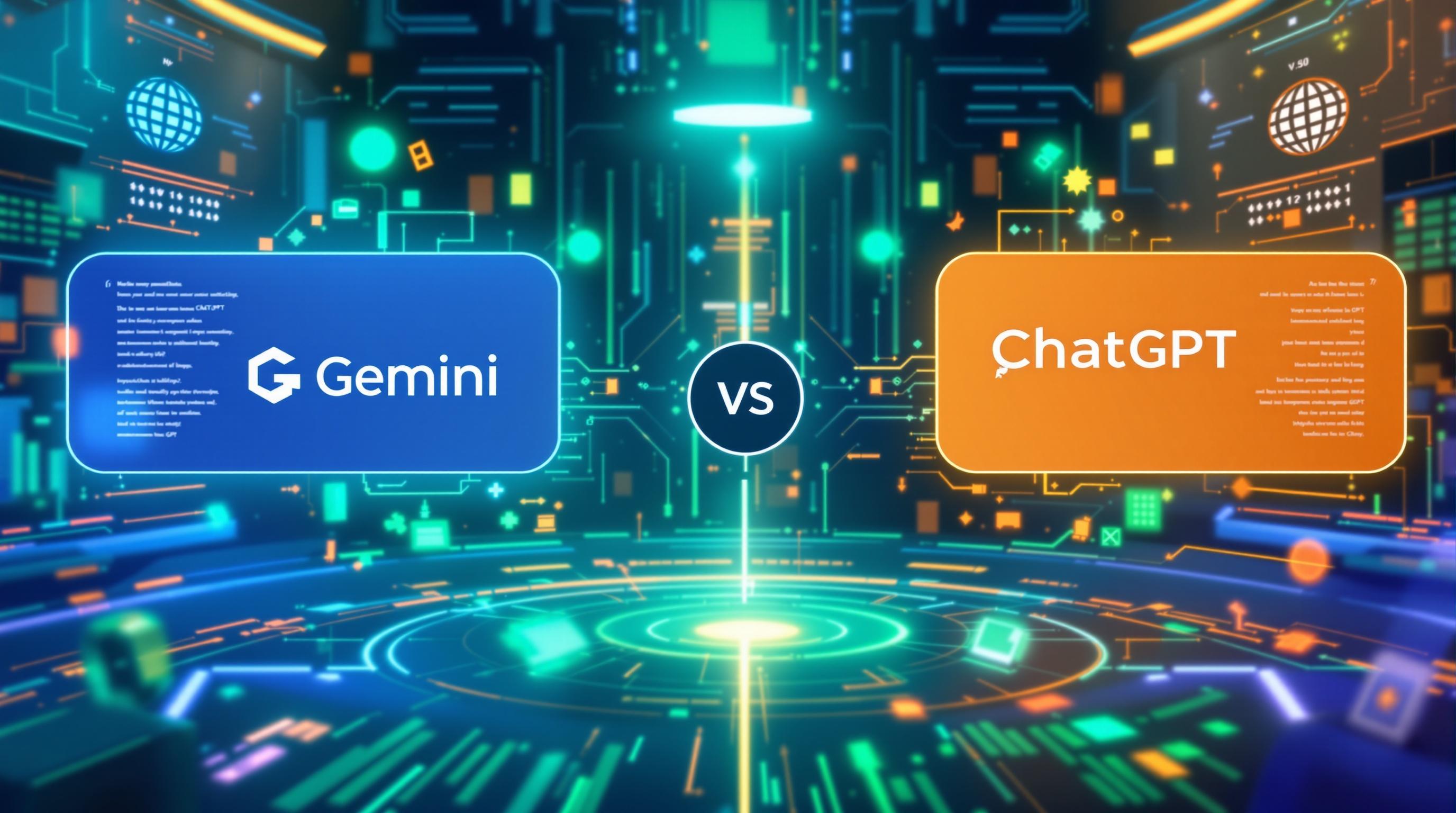Gemini vs. ChatGPT: Which AI Assistant is Right for You? Find the best AI

Navigate the AI landscape with our Gemini vs. ChatGPT showdown, unlocking the best tool for your needs based on output quality, speed, and cost. Discover how Gemini's multimodal prowess or ChatGPT's reasoning accuracy can boost your productivity, and start experimenting with free trials to find your perfect AI match.
Gemini vs. ChatGPT: A Comprehensive AI Showdown
Artificial intelligence is no longer a futuristic fantasy; it's a present-day reality, with AI assistants like Gemini and ChatGPT leading the charge. ChatGPT, developed by OpenAI, is a versatile language model known for its ability to generate human-like text, translate languages, and answer questions informatively. Gemini, on the other hand, is Google's cutting-edge AI model, designed with multimodality in mind, excelling in understanding and generating text, images, audio, and video.

The AI Arena: Output Quality, Speed, and Cost
This Gemini vs ChatGPT overview dives deep into a comprehensive comparison, focusing on the critical aspects that matter most to users: output quality, speed, and cost. We'll dissect how each AI assistant performs in various tasks, from creative writing and code generation to complex problem-solving and data analysis. We'll explore the nuances of their responses, judging their accuracy, coherence, and overall usefulness. Furthermore, we'll examine the speed at which they deliver results and the financial implications of using each platform, considering factors like subscription fees and pay-per-use models. Like choosing between a nimble sports car and a powerful truck, the best option depends entirely on what you need to accomplish.
Tailoring AI to Your Unique Needs
Ultimately, the goal is to empower you to make an informed decision. Selecting the right AI assistant isn't about crowning a single winner; it's about identifying the tool that best aligns with your specific requirements and priorities. Are you a marketer seeking engaging content for your campaigns? Perhaps HubSpot Email Writer is what you need. Or a developer in need of real-time coding assistance? Consider Github Copilot. Whether you're a student, a professional, or simply curious about the potential of AI, understanding the strengths and weaknesses of each assistant will enable you to harness their power effectively. As we move forward, keep in mind that the AI landscape is constantly evolving, and staying informed is key to maximizing the benefits of these powerful technologies. Keep checking our AI News for the latest developments.
Output Quality: Accuracy and Capabilities
The heart of any AI assistant lies in the quality of its output – its accuracy, reliability, and ability to perform different tasks effectively. When comparing Google Gemini and ChatGPT, understanding their respective strengths and weaknesses in output quality is crucial for choosing the right tool.
Gemini vs. ChatGPT: A Side-by-Side Comparison
To provide a clear overview, here's a table summarizing the key differences in output quality between Gemini and ChatGPT:
Feature | Gemini | ChatGPT |
|---|---|---|
Multimodal Accuracy | Excels in integrating and accurately interpreting information from various modalities (text, images, audio, video). | Primarily text-based, with limited native multimodal capabilities. Relies on plugins for image/audio understanding. |
Structured Reasoning | Good, but can sometimes struggle with complex logical deductions and multi-step reasoning tasks. | Demonstrates superior structured reasoning, particularly in tasks requiring logical deduction, problem-solving, and planning. |
Hallucinations | Can still produce inaccurate or fabricated information, especially when dealing with less common topics. | Susceptible to generating hallucinations, especially when faced with ambiguous or complex prompts. |
Creative Writing | Capable of generating creative content, but might lack the nuanced understanding of style and tone seen in ChatGPT. | Strong creative writing capabilities, including poetry, fiction, and scriptwriting, with better stylistic adaptation. |
Code Generation | Solid coding skills, but might require more specific prompting for optimal results. | Known for generating high-quality code in various programming languages, often with minimal prompting. |

Gemini's Multimodal Prowess vs. ChatGPT's Reasoning Accuracy
One of Gemini's standout features is its high multimodal accuracy. Because Gemini was built from the ground up to be multimodal, it exhibits an enhanced ability to seamlessly integrate and understand different types of information, be it text, images, audio, or video. This makes Gemini particularly well-suited for tasks that involve analyzing and synthesizing information from multiple sources.
Think of it like this: Gemini is like a detective who can piece together clues from various sources – a photograph, a witness statement, and a piece of physical evidence – to solve a case.
On the other hand, ChatGPT demonstrates superior structured reasoning. It is particularly adept at handling tasks that demand logical deduction, problem-solving, and step-by-step planning. While it can process images via plugins, its core strength lies in its ability to analyze textual data and draw logical inferences.
Imagine ChatGPT as a skilled chess player who can think several moves ahead, anticipating different scenarios and formulating a winning strategy.
Strengths in Different Tasks
The different strengths of Gemini and ChatGPT make each model better-suited for specific types of tasks. Here are a few examples:
- Gemini: Ideal for tasks such as image captioning, video summarization, multimodal data analysis, and creating presentations with integrated visuals.
- ChatGPT: Excels in tasks like writing articles, generating code, engaging in complex conversations, providing detailed explanations, and creating structured outlines.
It is important to remember that both models can produce inaccurate or fabricated information, also known as "hallucinations." You should use a tool such as GPTZero or OriginalityAI to verify AI-generated content.
Ultimately, the choice between Gemini and ChatGPT depends on the specific tasks you need to accomplish. By understanding their respective strengths and weaknesses in output quality, you can make an informed decision and leverage the power of AI to enhance your productivity and creativity. As AI continues to evolve, staying informed through resources like AI News will be vital to navigating the rapidly changing landscape.

Speed and Performance: Real-Time vs. Complex Tasks
In the fast-paced world of AI, speed is everything, but not all speed is created equal. When it comes to choosing between Gemini and ChatGPT, understanding their speed and performance nuances is crucial. ChatGPT is a versatile language model excels at generating human-like text, translating languages, and engaging in conversations, while Gemini excels in integration across Google's ecosystem. Let's break down how these AI assistants perform in different scenarios.
Gemini: Optimized for Real-Time Interactions
Gemini shines when it comes to real-time information retrieval and quick question answering.
Think of Gemini as your go-to AI for those moments when you need immediate answers. Because it's deeply integrated with Google's search capabilities, Gemini is designed to provide fast, up-to-date information. Need to know the current weather, the latest stock prices, or a quick fact check? Gemini can deliver those answers almost instantaneously. This makes it an excellent choice for users who prioritize speed and efficiency in their daily interactions. In contrast, Perplexity, another powerful AI tool, focuses on providing comprehensive answers with citations, which might take slightly longer but offers added depth and trustworthiness.
ChatGPT: Coding Speed and Creative Prowess
While Gemini excels at real-time queries, ChatGPT demonstrates remarkable speed when it comes to generating code and tackling creative writing tasks. If you're a developer looking for quick code snippets or a writer seeking assistance with brainstorming ideas, ChatGPT could be your preferred tool. Its architecture allows it to rapidly process and generate complex code structures, making it a valuable asset for programmers of all levels. It's this speed that makes it a great option for comparing it to Codeium, an AI-powered coding assistant, which makes coding faster by autocompleting code.
The Complexity Conundrum: Potential Slowdowns
It's important to note that while Gemini is generally fast, it can experience slowdowns when dealing with highly complex prompts.
This is where the rubber meets the road. While Gemini's real-time capabilities are impressive, its performance can be impacted when faced with intricate or multifaceted queries. Imagine asking Gemini to analyze a complex dataset while simultaneously providing a detailed summary and comparing it to historical trends. Such a task, demanding significant computational resources, might result in a noticeable lag. This contrasts with simpler queries, where Gemini's speed remains consistently high. This is in line with other tools, such as WolframAlpha, which might take a bit longer to generate the response.
To better illustrate the variations:
Task | Gemini Speed | ChatGPT Speed |
|---|---|---|
Real-time Information | Very Fast | Moderate |
Code Generation | Moderate | Fast |
Complex Data Analysis | Slower | Moderate |
Creative Writing (Short) | Fast | Fast |
Choosing between Gemini and ChatGPT hinges on your specific needs and priorities. If speed and real-time access to information are paramount, Gemini is an excellent choice. If you require rapid code generation or creative writing assistance, ChatGPT may be the better fit. As AI technology continues to evolve, these tools will undoubtedly become even faster and more efficient, further blurring the lines between their respective strengths. Understanding these nuances allows you to leverage the best of both worlds in your AI-driven endeavors, and as AI continues to evolve it might be worth looking at a comprehensive list of Top 100 AI Tools to see which ones fit your needs.

Cost Analysis: Subscription Tiers and Value
The burning question on everyone's mind: how much do these AI powerhouses actually cost, and what do you get for your money? Let's break down the subscription tiers and explore the value proposition of both Google Gemini and ChatGPT. ChatGPT is a versatile language model known for generating human-like text and engaging in conversations.
Gemini Advanced vs. ChatGPT Plus/Pro: A Cost Comparison
For users seeking the most advanced capabilities, both Google and OpenAI offer premium subscription options. Google's top tier is Gemini Advanced, while OpenAI offers ChatGPT Plus and ChatGPT Pro (though Pro is more targeted at developers and enterprise users). Let's look at the pricing structure:
- Gemini Advanced: Included with the Google One AI Premium plan, which costs $19.99 per month. This plan also includes 2TB of cloud storage and other Google One benefits. It's worth noting that the availability of Gemini Advanced can vary by region.
- ChatGPT Plus: This subscription also costs $20 per month and grants users access to GPT-4, OpenAI's flagship language model, along with faster response times and priority access to new features. GPT-4 is known for its enhanced reasoning and creative capabilities.
While the monthly cost is the same, the bundled benefits differ. With Gemini Advanced, you get substantial cloud storage, which could be a deciding factor if you're already paying for cloud storage. With ChatGPT Plus, the focus is purely on enhanced AI access and speed.
Access and Usage Limits: How Much Can You Actually Use?
Beyond the sticker price, it's crucial to understand the access and usage limits associated with each subscription. After all, what good is a powerful AI if you can't use it when you need it?
Gemini Advanced, while powerful, has been observed by users to implement rate limiting. This means there are caps on the number of prompts or queries you can make within a certain timeframe. Google has not officially published the exact limits, and they may be subject to change. These limits are in place to ensure fair usage and prevent abuse of the system.
ChatGPT Plus also has usage caps on GPT-4. Previously, there was a limit of 40 messages every 3 hours. OpenAI has adjusted these limits over time, but users should still be aware that heavy usage may be throttled. OpenAI has not announced the current limits.
Understanding these limits is key to determining which subscription aligns best with your typical usage patterns. If you anticipate needing extremely high volumes of AI interaction, it's worth exploring alternative solutions or considering enterprise-level plans.
The Free Tier: Exploring the Limitations
Both Google and OpenAI offer free tiers for their AI assistants, allowing users to experience the technology without a financial commitment. However, it's important to understand the limitations of these free options.
- Gemini (Free): The free version of Gemini provides access to a less powerful model compared to Gemini Advanced. It's suitable for basic tasks like answering simple questions, generating short snippets of text, or brainstorming ideas. However, it lacks the advanced reasoning, creative capabilities, and integration with other Google services found in the paid version.
- ChatGPT (Free): The free version of ChatGPT typically uses the GPT-3.5 model, which is a capable language model but less advanced than GPT-4. Free users may also experience slower response times and limited access during peak periods due to server capacity constraints.
The free tiers are a great way to dip your toes in the water and explore the potential of AI assistants. However, for serious users who require advanced capabilities and consistent access, a paid subscription is generally necessary.
Ultimately, the "best" option depends on your individual needs and priorities. Carefully consider your usage patterns, desired features, and budget to make an informed decision. Don't forget to explore the wide world of AI News to keep up with the rapid developments in AI and how they might impact your choices. Now, let's delve into a head-to-head comparison of the strengths and weaknesses of Gemini and ChatGPT, exploring their unique capabilities in detail.

Gemini AI: User Insights - Pros and Cons
Stepping away from the theoretical and diving into the practical, let's explore what real users are saying about their experiences with Google Gemini. We've scoured forums, reviews, and social media to bring you a balanced perspective, highlighting both the triumphs and the pain points.
The Allure of Multimodal Mastery and Workspace Harmony
One of the most consistently praised aspects of Gemini is its multimodal support. Users rave about its ability to seamlessly integrate and understand various types of data – text, images, audio, and even video. It’s like having an AI assistant that doesn't just read but also sees and hears the world around it. This makes Gemini incredibly versatile for tasks ranging from brainstorming creative content to analyzing complex datasets that include visual elements.
"The fact that I can upload an image and ask Gemini to describe it, then use that description as a starting point for a blog post is a game-changer. It saves me so much time!"
Another significant advantage, particularly for those deeply embedded in the Google ecosystem, is Gemini's seamless integration with Google Workspace. Imagine effortlessly pulling data from Google Sheets, summarizing key insights in Google Docs, and then creating a presentation in Google Slides, all powered by Gemini's AI capabilities. It streamlines workflows and eliminates the friction of switching between different applications. This tight integration is a major selling point for many users who already rely on Google's suite of productivity tools.
- Simplified workflows: Connects seamlessly with Google Docs, Sheets, Slides, and more.
- Enhanced productivity: Automates tasks and provides intelligent assistance within familiar apps.
- Contextual understanding: Leverages data from your Google Workspace to provide more relevant and accurate results.
The Promise of a Large Context Window
Gemini boasts a large context window, enabling it to maintain a coherent and consistent conversation even across lengthy exchanges. This means you don't have to constantly re-explain the context of your query, as Gemini remembers previous interactions and incorporates them into its responses. This is particularly useful for complex projects that require sustained engagement and nuanced understanding. Think of it like having a research assistant that can keep track of all the details of your project, no matter how intricate.
Tone Troubles and Tasking Tribulations
While Gemini shines in many areas, some users have expressed concerns about its limitations. One recurring criticism is the lack of fine-grained control over tone personalization. Some users find it challenging to consistently coax Gemini into adopting a specific voice or writing style, especially when compared to other AI models that offer more granular control over tone and persona.
Another point of contention is speed, especially when tackling complex tasks. While Gemini is generally responsive, some users have reported noticeable delays when processing large datasets or generating intricate outputs. This can be a bottleneck for users who require rapid turnaround times.
Feature | Pro | Con |
|---|---|---|
Multimodal Support | Excellent at handling various data types (text, images, audio, video) | N/A |
Google Workspace Integration | Seamless connection and workflow automation within Google apps | N/A |
Context Window | Large context window allows for coherent and consistent conversations | N/A |
Tone Personalization | N/A | Limited control over adopting specific writing styles or voices |
Speed | Generally responsive | Can be slow when processing complex tasks or large datasets |
In conclusion, user feedback paints a picture of Gemini as a powerful and versatile AI assistant with notable strengths in multimodal support, Google Workspace integration, and context retention. However, it also highlights areas where Gemini could improve, particularly in tone personalization and speed optimization. These insights are invaluable as you consider whether Gemini is the right AI tool for your specific needs. Next, we'll dive into a head-to-head comparison, pitting Gemini against ChatGPT to see how they stack up in key areas.

ChatGPT: User Insights - Pros and Cons
Let's dive into the world of ChatGPT, one of the most talked-about AI assistants, through the eyes of its users, weighing the submitted pros and cons to give you a balanced perspective.
The Allure of Advanced Reasoning and Rapid Code Generation
One of the most frequently lauded advantages of ChatGPT is its advanced reasoning capabilities. Users often highlight its ability to grasp complex concepts and provide insightful explanations, making it a valuable tool for learning and problem-solving. It's like having a knowledgeable tutor available 24/7, ready to assist with everything from philosophical debates to intricate scientific theories.
Furthermore, ChatGPT shines in code generation. Many developers praise its speed and accuracy in producing code snippets, debugging existing code, and even generating entire programs. Imagine you're building a website and need a specific function written in Python. ChatGPT can quickly provide you with a working code block, saving you countless hours of manual coding and debugging. A similar tool is GitHub Copilot, an AI pair programmer that suggests code and entire functions in real-time, directly within your coding environment.
Unleashing Creativity with Customizable GPTs
Another significant advantage is the ability to create customizable GPTs. This feature allows users to tailor ChatGPT to specific tasks and domains, enhancing its usefulness and efficiency. Think of it as creating specialized AI assistants for different aspects of your life or work. For instance, you could create a GPT specifically for writing marketing copy, another for summarizing legal documents, and yet another for generating creative writing prompts. This level of customization makes ChatGPT a versatile tool adaptable to a wide range of needs.
The Context Window Conundrum and Cost Considerations
Despite its many strengths, ChatGPT isn't without its limitations. A common concern among users is its smaller context window compared to some of its competitors. This means that ChatGPT may struggle to maintain coherence and relevance in longer conversations or when dealing with complex, multi-layered tasks. It's like trying to assemble a jigsaw puzzle with missing pieces – the overall picture may be incomplete or inaccurate.
Another point of contention is the cost of higher subscription tiers. While ChatGPT offers a free version with basic functionality, accessing its more advanced features and capabilities often requires a paid subscription. For some users, especially those on a tight budget, the cost of these subscriptions may be prohibitive. Other options include tools like DeepSeek which focus on providing cost-effective AI solutions.
Ultimately, ChatGPT presents a compelling package of advanced AI capabilities, but users should carefully weigh its limitations and cost considerations against their specific needs and priorities. Understanding the pros and cons is crucial to making an informed decision about whether ChatGPT is the right AI assistant for you. Next, let's examine Google Gemini through the same lens.

For more AI insights and tool reviews, visit our website https://best-ai-tools.org, and follow us on our social media channels!
- Website: https://best-ai-tools.org
- X (Twitter): https://x.com/bitautor36935
- Instagram: https://www.instagram.com/bestaitoolsorg
- Reddit: https://www.reddit.com/r/findAIwithAI/
- Telegram: https://t.me/BestAIToolsCommunity
- Medium: https://medium.com/@bitautor.de
- Spotify: https://creators.spotify.com/pod/profile/bestaitools
- Facebook: https://www.facebook.com/profile.php?id=61577063078524
- YouTube: https://www.youtube.com/@BitAutor
Recommended AI tools
Perplexity
Search & Discovery
Clear answers from reliable sources, powered by AI.
Cursor
Code Assistance
The AI code editor that understands your entire codebase
DeepSeek
Conversational AI
Efficient open-weight AI models for advanced reasoning and research
GitHub Copilot
Code Assistance
Your AI pair programmer and autonomous coding agent
Notion AI
Productivity & Collaboration
The all-in-one AI workspace that takes notes, searches apps, and builds workflows where you work.
Suno AI
Music Generation
Empowering Your Data with AI
Was this article helpful?
Found outdated info or have suggestions? Let us know!


